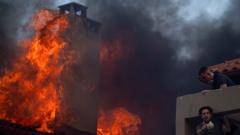Despite ongoing challenges, including temperatures soaring to 42.4°C (108.32°F) in central Greece, authorities have managed to contain many wildfires. In Greece, smoke and flames are rampant in the Peloponnese region and on islands such as Evia and Crete, while Turkish officials report unprecedented temperatures, hitting 50.5°C in Silopi.
Turkey’s forestry minister acknowledged the severity of the blazes, predicting a prolonged battle to contain the fires, with tragic consequences already reported, including 10 fatalities among fire personnel in Eskisehir. Reports indicate that local authorities are enforcing water usage restrictions in several areas impacted by the wildfires.
In Greece, firefighters have called for EU assistance, deploying six aircraft as they combat flames fueled by high winds. Despite recent progress reported, significant damage to properties, agricultural land, and natural forests continues to mount, leading to the evacuation of residents in several villages.
Multiple hotspots remain active across the regions, with emergency services on high alert as conditions remain precarious. On the island of Crete, efforts to combat a sprawling wildfire front continue to be hampered by strong winds and power outages affecting local communities.
Greece's firefighting efforts are under intense scrutiny following recent devastating fire events, which have severely impacted the region, raising urgent questions about disaster preparedness and response.
The climate crisis looms large over these tragedies, prompting calls for urgent action to address the increasing frequency and severity of wildfires exacerbated by extreme weather conditions.
As locals continue to face the brunt of this climate threat, the situation highlights the urgent need for both immediate response and long-term strategies to mitigate future wildfire risks.
Turkey’s forestry minister acknowledged the severity of the blazes, predicting a prolonged battle to contain the fires, with tragic consequences already reported, including 10 fatalities among fire personnel in Eskisehir. Reports indicate that local authorities are enforcing water usage restrictions in several areas impacted by the wildfires.
In Greece, firefighters have called for EU assistance, deploying six aircraft as they combat flames fueled by high winds. Despite recent progress reported, significant damage to properties, agricultural land, and natural forests continues to mount, leading to the evacuation of residents in several villages.
Multiple hotspots remain active across the regions, with emergency services on high alert as conditions remain precarious. On the island of Crete, efforts to combat a sprawling wildfire front continue to be hampered by strong winds and power outages affecting local communities.
Greece's firefighting efforts are under intense scrutiny following recent devastating fire events, which have severely impacted the region, raising urgent questions about disaster preparedness and response.
The climate crisis looms large over these tragedies, prompting calls for urgent action to address the increasing frequency and severity of wildfires exacerbated by extreme weather conditions.
As locals continue to face the brunt of this climate threat, the situation highlights the urgent need for both immediate response and long-term strategies to mitigate future wildfire risks.
















